In the pursuit of a healthy life and a perfect body, home gym has become the choice of more and more families. These private fitness spaces not only provide family members with the convenience of exercising anytime, anywhere, but also become a safe and convenient way to work out during special times.
Among the many fitness equipment in a home gym, the barbell is undoubtedly an important and indispensable piece of equipment. Especially for people who like to strength training, squatting and other complex movements, a suitable deadlift barbell can make the effect of exercise twice as much. This article will guide you through the process of choosing the right home barbell for your home gym.
-
Understanding the different types of barbells
-
Consider the space and budget of the home gym
-
Choose the barbell suitable for personal needs
-
Conclusion
Understanding the different types of barbells
When choosing a barbell for your home gym, you first need to have an understanding of the common types of barbells available in the market.
Olympic barbells are usually longer and heavier, with swivel bearings and threads on both ends to hold standard weight barbell pieces. This barbell is a common choice in professional gyms and strength training. Olympic barbells are suitable for training compound movements such as squats, bench presses, and hard pulls, as well as for Olympic weightlifting programs such as the snatch and jerk.
-
Standard Barbell
Shorter and lighter than Olympic barbells, standard barbells usually do not have swivel bearings and the barbell plates are usually secured to the barbell by locking pins or screws. Standard barbells are better suited for home gyms because they take up less space and are suitable for beginners and those who don't need to train with Olympic lifts.
-
Women's Barbell
Women's barbells are usually lighter and have thinner bars to accommodate the hand size and strength level of female athletes. Women's barbells are ideal for female fitness enthusiasts, especially those who are new to strength training or looking to improve muscle definition.
-
Fixed-Weight Barbell
Fixed-weight barbells have fixed-weight barbell pieces already attached to the bar and cannot increase or decrease the weight. The advantage of this type of barbell is that it is easy to carry and store without having to buy additional barbell pieces. Fixed weight barbells are suitable for home gyms with limited space or budget.
-
Curved Bar Barbell

Curl barbells have a curved shape to the bar and are designed to reduce stress on the wrists and elbows while increasing the biceps and triceps workout. Curved bar barbells are suitable for arm training movements such as curls and arm flexion, as well as for those who are prone to wrist or elbow injuries.
Consider the space and budget of the home gym
When choosing a barbell for your home gym, in addition to considering its type and features, you need to fully consider the space and budget constraints of your home gym.
First of all, the space of your home gym is an important factor that must be considered when choosing a barbell. If you have limited space in your home gym, it's important to choose a barbell that is a decent size and easy to store. For example, standard barbells are more suitable for home gyms with less space than Olympic barbells due to their shorter length and lighter weight. Next, budget is also a key factor to consider when choosing a home gym barbell. Prices of barbells vary greatly between brands, types and configurations. In general, Olympic barbells are usually more expensive due to their high-quality materials and manufacturing process. Standard barbells, on the other hand, are relatively more affordable and suitable for home gyms on a budget.
Choose the barbell suitable for personal needs
When choosing a barbell that suits individual needs, we need to consider factors such as personal fitness goals, training experience, and physical conditions.
First and foremost, your personal fitness goals are the primary consideration when choosing a barbell. If your goal is to build muscle, then you may want to choose a barbell that can handle more weight. If your goal is to lose fat or get in shape, then you may want to choose a barbell that is suitable for basic strength training and muscle toning. Secondly, personal training experience is also a factor to consider when choosing a barbell. For beginners, it is important to choose a barbell that is easy to master and safe. Whereas, for experienced bodybuilders, they may need a more specialized barbell for their complex training needs.
Conclusion
When choosing a barbell for your home gym, you need to consider the type, space and budget to make sure it matches your personal fitness goals and conditions. Hopefully this article has been of some help in your choice of barbell.
Q&A
Q: How do I determine the weight of the barbell I need?
A: To determine the weight of the barbell you need, consider your fitness goals, current strength level, and ability to perform the desired exercises with proper form.
Q: How should I store and care for my barbell?
A: Keep it in a dry, ventilated place and wipe it clean with a dry, soft cloth after each use to remove dirt and sweat. Regularly inspect and apply a light coat of rust-preventing oil to protect the surface and prevent corrosion.
Q: Where can I buy reliable quality barbells?
A: You can buy reliable quality barbells from professional fitness equipment stores, online retailers with good reputations, or brands that are known for their durability and quality.
Reference
https://barbend.com/how-to-choose-barbell/
https://www.garagegymreviews.com/how-to-choose-a-barbell
https://powerliftingtechnique.com/best-barbell/
https://www.garagegymreviews.com/barbell-buying-guide
https://magmafitness.com/blogs/magma-blog/how-to-choose-the-right-barbell-for-your-home-gym







